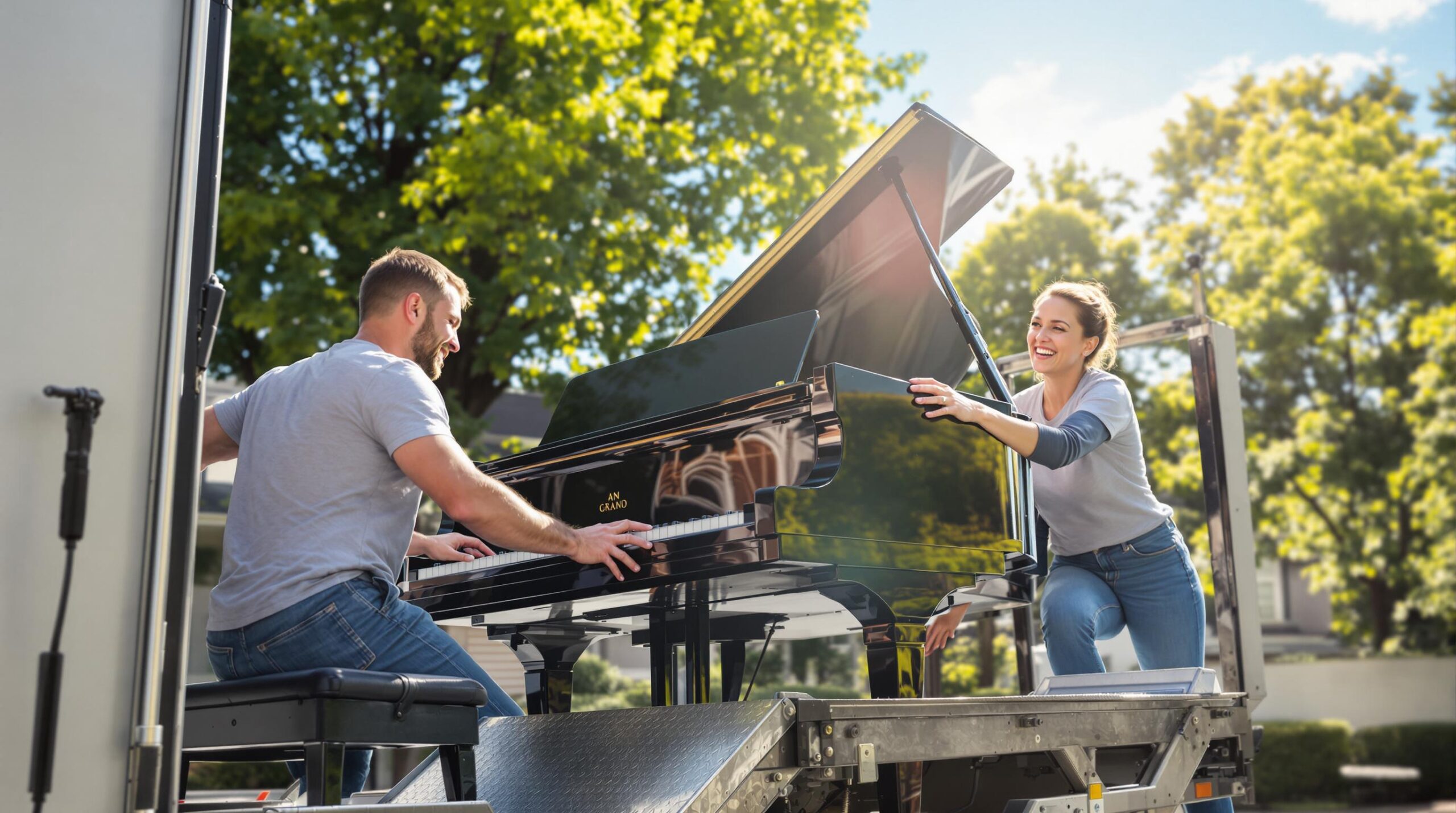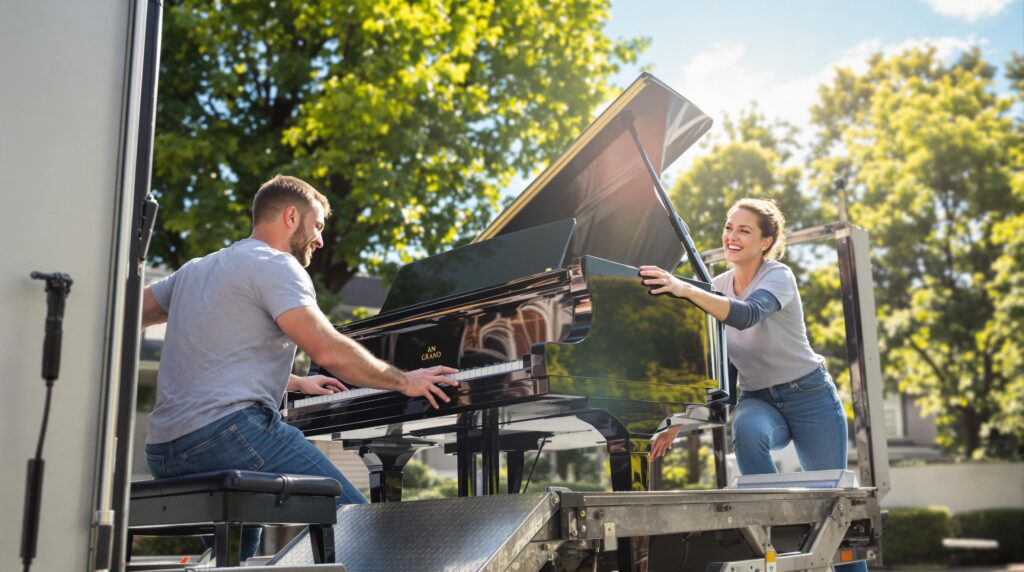
Want to donate your piano and make a difference? Here’s a quick guide to help you donate your piano, arrange free pickup, and even claim tax benefits. Whether your goal is to support music education, community programs, or repurpose your piano, this guide covers everything you need to know.
Key Steps to Donate Your Piano:
- Check the Piano’s Condition: Ensure it’s in working order and easy to transport.
- Find Free Pickup Services: Nonprofits, schools, and professional movers often offer free transportation.
- Prepare Documentation: Gather tax receipts, appraisal records (if needed), and donation acknowledgments.
- Schedule Pickup: Provide details like location, dimensions, and special handling needs.
- Claim Tax Benefits: Depending on the piano’s value, you may need additional IRS forms or appraisals.
Other Options:
- Sell It: Use platforms like Facebook Marketplace or work with piano dealers.
- Repurpose It: Transform the piano into furniture or decor.
- Dispose Responsibly: Recycle or hire removal services for non-functional pianos.
Ready to donate? Follow these steps to ensure a smooth process while giving your piano a new home and purpose.
10 Things to Know About Donating a Piano (and Getting a Tax Write-off)
Check if Your Piano Qualifies for Donation
Wondering if your piano is a good fit for donation? Most programs look for instruments that are in working order and in decent physical shape.
Evaluating Your Piano’s Condition
You don’t need a professional inspection to check the basics. Make sure the piano works for simple play – keys and pedals should function, and it should produce a clear sound. Once you’ve confirmed this, consider the practical requirements for donation.
General Donation Requirements
Many organizations also need the piano to be easy to move. It’s best to check directly with the donation program to see if your piano qualifies. For example, Cooper Piano works with a variety of community organizations [1], showing that requirements can differ depending on the group.
Free Piano Pickup Services
Donating your piano? Many services provide free transportation to ensure your piano finds a new home safely.
Nonprofit Organizations
Nonprofits often accept piano donations and may include pickup services. When choosing an organization, it’s crucial to confirm their credentials and experience with delicate instruments. Look for groups that:
- Have trained teams for piano moving
- Include insurance coverage
- Provide tax documentation
- Offer flexible scheduling for pickups
Education Programs
Schools and music programs are frequently in need of pianos and may organize pickups through their preferred movers. These programs often:
- Collaborate with local moving services
- Schedule pickups during limited timeframes, like school breaks
- Require advance planning
- Supply tax deduction paperwork
If your piano requires specialized handling, professional movers might be the best choice.
Piano Moving Companies
Professional piano movers are a dependable option for transporting donations. In the Atlanta metro area, Cooper Piano is a standout example of this service. Customers consistently praise their expertise:
"They know what it takes to move a delicate instrument and are very careful. Avoid standard movers; Cooper Piano provides expert care." – Marilyn Romeu [1]
Between October 2024 and February 2025, Cooper Piano moved a piano three times for Amy Caloritis, who shared:
"Everyone is incredibly professional and wonderful, and I’m glad to have placed my trust, and my piano in their hands." – Amy Caloritis [1]
When choosing a piano moving company, prioritize those that:
- Specialize in piano transport and offer expert handling
- Include full insurance coverage
- Provide flexible hours (Cooper Piano, for instance, operates Monday-Saturday from 10 a.m. to 6 p.m. and Sundays from 1 p.m. to 5 p.m.)
- Communicate clearly throughout the process
sbb-itb-b8bc1ab
Steps to Donate Your Piano
Pre-Donation Checklist
Before donating your piano, make sure it’s easy to access. Clear doorways, hallways, and stairwells of any obstacles. Secure movable parts like the lid, fallboard, and music desk to prevent damage. Take clear photos from multiple angles to document its condition. Once everything is ready, you’re set to arrange the pickup.
Pickup Arrangements
Using professional piano movers, such as Cooper Piano, can simplify the process. Here’s what one satisfied customer shared:
"I spoke with Leigh Ann who was very kind and professional and she helped to arrange everything. The movers were Link and De’Angelo and both were courteous and professional. I would recommend this company and these specific movers to anyone and will not hesitate using them for future needs." – Jodie Ng [1]
To ensure a smooth pickup, provide the following details:
- Exact piano dimensions and type
- Current location specifics (floor level, stairs, elevator access)
- Preferred pickup dates and times
- Any special handling needs
- Contact information for both pickup and delivery locations
On the scheduled day, trained movers will handle the process based on these details.
Pickup Day Process
Professional movers follow a structured process to transport your piano safely. Here’s how it works:
- They assess the piano and determine the safest route for moving it.
- The instrument is wrapped with padding and blankets for protection.
- Specialized equipment, such as dollies and straps, is used for secure transport.
- Necessary paperwork for the donation is completed.
Amy Caloritis, who had her piano moved several times between October 2024 and February 2025, shared her experience:
"Everyone is incredibly professional and wonderful, and I’m glad to have placed my trust, and my piano in their hands." [1]
Tax Benefits and Legal Steps
Once your piano has been picked up, it’s time to handle the legal and tax-related tasks to ensure you can claim your charitable deduction.
Tax Deduction Guide
Donating a piano allows you to claim its fair market value as a charitable contribution on your tax return. To make the most of this deduction, make sure the recipient is a qualified nonprofit. The IRS has specific documentation requirements based on the piano’s value:
- Under $250: Keep a written record of the donation.
- $250–$500: Obtain a written acknowledgment from the nonprofit.
- $500–$5,000: Fill out IRS Form 8283 Section A.
- Over $5,000: Complete IRS Form 8283 Section B and secure a qualified appraisal.
Piano Value Assessment
The value of your donated piano is determined by several factors, all of which need proper documentation for tax purposes:
| Factor | Required Documentation |
|---|---|
| Age and Brand | Original purchase documents or manufacturer info |
| Current Condition | Report from a professional inspection |
| Market Comparison | Data on recent sales of similar models |
| Professional Appraisal | Written evaluation by a certified appraiser |
Before donating, have your piano appraised by a certified professional. Many organizations, such as Cooper Piano, provide appraisal services that meet IRS standards for charitable contributions [1]. Once the appraisal is complete, gather all relevant details for your donation paperwork.
Required Papers
Create a donation file that includes the following:
- Donation Receipt: An official acknowledgment from the nonprofit, which should include:
- The organization’s name and address
- The date of the donation
- A description of the piano
- A statement confirming no goods or services were exchanged for the donation
- Appraisal Documentation: For pianos valued over $5,000, ensure the file contains:
- An appraisal completed within 60 days before the donation
- The appraiser’s qualifications
- Details on the valuation method used
- Supporting Evidence:
- Photos of the piano
- Original purchase records
- Maintenance history
- Any correspondence with the nonprofit
Hold onto these documents for at least three years after filing the tax return that includes your deduction. The IRS may request them as proof of your charitable contribution during this period.
Other Options Besides Donation
If donating your piano isn’t an option, there are still ways to give it a new purpose.
Selling Options
Selling your piano can help you recover some of your investment. Here are a few ways to sell:
- Professional Piano Dealers: Businesses like Cooper Piano [1] can handle the sale and even assist with moving the piano.
- Private Sale Platforms: Use platforms such as:
- Facebook Marketplace
- Craigslist
- Piano-focused forums
- Bulletin boards at local music stores
| Channel | Pros | Cons |
|---|---|---|
| Piano Dealer | Professional service, moving support | Lower sale price compared to private sales |
| Online Marketplace | Wider audience, higher price potential | Requires managing inquiries and avoiding scams |
| Local Music Store | Buyers often already interested in music | Commission fees and a smaller audience |
If selling doesn’t work for you, there are other options to consider.
Piano Disposal Methods
When your piano is beyond repair or no longer functional, disposing of it responsibly is key. Consider these methods:
- Professional Removal Services: Hire specialists to dismantle and remove the piano safely.
- Recycling Facilities: Many parts of a piano, like its wood and metal, can be recycled at appropriate centers.
If disposal feels wasteful, think about turning the piano into something new.
Piano Repurposing Ideas
A piano that can’t be sold or played can still have a second life as furniture or decor. Here are some ideas:
- Functional Creations:
- Turn the piano cabinet into a bookshelf or writing desk.
- Build a wine rack or display cabinet using its wood.
- Decorative Uses:
- Make wall art from the piano keys.
- Repurpose the cabinet into a garden planter.
- Use parts of the piano as decor in a music-themed room.
For safety and quality, work with craftspeople familiar with piano construction when repurposing it.
Conclusion
Quick Steps Review
Here’s a quick rundown of the steps to donate your piano:
- Assess your piano’s condition.
- Contact nonprofit organizations to find a recipient.
- Hire professional piano movers.
- Gather all necessary tax and ownership documents.
- Schedule the pickup and get your piano ready.
| Phase | Key Actions | Important Considerations |
|---|---|---|
| Pre-Donation | Assess condition, choose recipient | Piano must be in working condition |
| Moving | Hire professionals, schedule pickup | Only use specialized piano movers |
| Documentation | Prepare tax and ownership forms | Keep thorough records |
Beyond the logistics, your donation can create a meaningful difference in the lives of others.
Making an Impact
Cooper Piano [1] shows how professional services can simplify the donation process, from expert piano moving to fostering connections with community programs.
By donating your piano, you can:
- Support music education programs.
- Strengthen community arts initiatives.
- Help healthcare facilities offer music therapy.
- Provide resources for women’s shelters and community centers.
This simple gesture turns your piano into a tool for positive change. With help from experts like Cooper Piano, your donation not only ensures safe transit but also leaves a lasting impression on the communities it serves [1].

